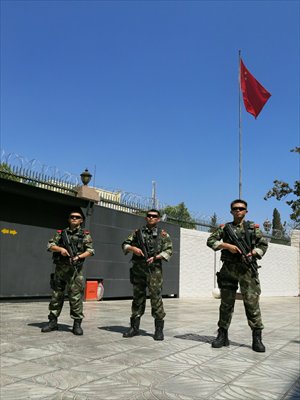Stand your ground

Chinese armed police officers stand guard in the Chinese embassy in Damascus. Photo: Yang Jingjie/GT
Taking an envelope from the bookshelf in his office, Zhang Xun, China's ambassador to Syria, paces back to his desk and sits down, a bulletproof vest hanging on the back of his chair. The items in Zhang's small office - a satellite phone on a side table, a gas mask beside an armchair, a pistol on his bedside table - remind visitors that they are in a war-torn country.
Inside the envelope were four charred shell fragments with sharp edges. Picking up the fragments, Zhang told the Global Times they came from a mortar shell launched by rebel forces into the capital from suburban Damascus.
"A shell hit the ceiling of a building some 60 meters away and the fragments bounced into our building," said Zhang.
Zhang and other embassy staff members have been in Damascus to safeguard the interests of Chinese nationals in Syria for the past two years.
Security threats
Throughout the interview with the Global Times on Wednesday, the thundering of mortar shells could be heard from the ambassador's office.
The Chinese embassy is located in a key area in Damascus, with Syria's presidential residence and army general staff's department nearby. Given these units are the main targets of the rebels' mortar strikes, the risks for collateral damage for the embassy are high.
Zhang said some of the worst damage to the embassy building took place on August 8, when Muslims were celebrating Eid al-Fitr.
In the early hours of Eid, a Syrian rebel brigade fired mortar shells at President Bashar al-Assad's motorcade, which was moving to a mosque not far from the Chinese embassy.
According to Zhang, the first shell hit a nearby building just 10 meters away. "Several windows in our corridor were shattered. Some of the shrapnel fell onto my balcony," he recalled.
One day in early May, a shell fell on the side of the Chinese embassy, blowing a big hole in the wall of the US embassy located just opposite.
Fang Min, head of the consular section, told the Global Times that diplomats have to frequently visit Syrian government departments that have been targeted by rebels, noting that a blast once took place just a few meters behind him during a visit to a Syrian company.
Being targeted
Staff of the Chinese embassy there are more alarmed at the prospect of rebel attacks targeting the embassy.
In the first half of 2012, nearly all Western diplomats left Syria, and following the Damascus bombing on July 18, 2012, which killed a number of top Syrian military and security officials, even countries holding a neutral stance on the crisis pulled out their diplomats.
China is among a dozen countries, including Russia, Iran, North Korea, Venezuela and Cuba, which still have envoys stationed in Damascus.
"The situation in Syria is special. In consideration of the relations between big powers and the international order, we decided to stay here," Zhang said.
Since the beginning of the crisis, China, as a permanent member of the UN Security Council, has vetoed three resolutions on Syria. It is no surprise that China's diplomatic mission has become a thorn in the side of rebel forces.
According to the embassy, a local driver hired by the embassy went to Jordan in February and was recruited by the Syrian opposition there.
After being arrested by Syrian authorities, the driver confessed that he had been ordered to place bombs under the embassy's car.
The Chinese government then assigned eight armed police officers to the embassy to protect the diplomats. Previously, only the embassies in Iraq and Afghanistan had armed police officers.
"To be honest, it would be a lie if I said I'm not a little bit scared," said the ambassador. Pausing for a puff from his cigarette, Zhang continued, "But we decided to make the accomplishment of our missions a priority."
Orderly evacuation
When Zhang took up the post of ambassador in August 2011, some 1,200 Chinese nationals were still in the country, most of them employees of Chinese-funded projects.
At that time, the Chinese government was considering pulling out all Chinese nationals, but Zhang discouraged the idea.
"I proposed minimizing the political impact and economic losses, and asked the Chinese companies to finish their projects if the situation allowed," said the ambassador, noting there was some opposition to the idea.
Every month, managers of Chinese enterprises in Syria convene at the embassy to discuss the security situation.
One Sichuan-based company responsible for building generators for a French-funded cement plant in Aleppo, a city that saw fierce fighting between government and rebel forces, pulled out its staff on the embassy's advice.
However, the French company then recruited some 30 laid-off workers from Sichuan through an illegal Chinese agent and brought them to Aleppo in early 2012.
After learning about the Chinese workers' arrival in Aleppo, the embassy sent staff to persuade them to leave. The workers finally left Aleppo in May and June 2012, shortly before security in the city deteriorated the following month.
"In the past 30 months, no single death or injury of Chinese nationals due to the violence in Syria has been reported," Zhang said.
Currently, only 26 Chinese nationals, excluding embassy staff, remain in the country. Eight of them are reporters and six had decided to leave Syria before Monday, according to data from the embassy.
The embassy also pulled out some of its staff members as the situation developed.
While some later returned as tensions eased, following the mortar shell attack, only 11 remained at the embassy.
Asked when all embassy staff be evacuated from Syria, Fang said, "Diplomats must stick to their positions until the last Chinese national willing to leave Syria is pulled out."